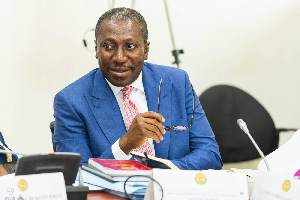The Trouble with African Spirituality is Kofi Akosah-Sarpong
Part 1 Benjamin Tawiah, LondonThere is a sense in which a documented statement denouncing a fact or an opinion should not be construed as a rejoinder. For, if anybody should be seen as a problem, and indeed if there is a problem for which blame must be apportioned, as we are wont to do, ‘the problem people’ that we are, then it is this writer, who did well to punch beyond his African reserve by sending a mail of appreciation to Mr. Akosah-Sarpong, and did the veritable ostrich by proceeding to pen a ‘retribution’ to contest the thesis of the very well written article by the latter. And, I feel like a crank, or perhaps a twit, but anything respectable than a nincompoop for never bothering to carefully read any of Kofi’s many articles until last week. In terms of numbers, he is only second to a fellow English and Journalism teacher in New York, who we must pause to reflect, has served the ghanaweb forum very well, as controversial as he has been. Perhaps, it is well that a reader commented that he is the putative doyen of ghanaweb, even if the cynical comment had meant to ‘cavalierly’ throw his own words back at him.
I was in Akosah-Sarpong’s thinking when he wrote that “no country in the world can develop outside its culture.” Well, he had completed Courage Quashigah’s thoughts by concurring to the statement. And it seems he is not alone; Ashra Kwesi, a US based African-American historian and scholar, thinks so, too. Kwesi has a bit of a following. He tours ancient Egyptian pyramids and archeological preservations in other countries, borrowing images and ancient writings to teach his followers that most of the concepts and practices in modern day Christianity were borrowed, and in his words, ‘stolen’ from Africans. He does it with so much finesse and scholarship that you feel guilty if you are not a believer in African customs and practices. “Brothers and sisters, they took it from us and turned it upside down”, he usually says.
In one instance, Kwesi, a charismatic gentleman who dresses in white robes all the time, intelligently explains the biblical Adam and Eve apple story in a way that makes the writers of the Bible look only a little honourable than Kwaku Ananse. Of course, the Bible itself was first written in Aramaic, a very old language, by men who were supposed to have been under the inspiration of the Holy Spirit. Without attempting to subject it to ‘canal’ scrutiny, for that is heresy, it makes sense to think that in the course of the series of translations that followed, intended meanings, and indeed content, may have been lost. He resorts to a diagrammatic analysis of symbols and paintings to explain some well established beliefs. For instance, he seems to suggest that Jesus Christ was originally black, but the early missionaries sought to present him as one of them, to drum their very good nature into the conscience of followers of the Christian religion. The cross and the crucifixion were all symbols and practices in the ancient religion; the white stole them from us. He preaches under the banner of an Egyptian truism which translates as ‘knowledge is key.’ And judging by his intellectual demeanour, you wouldn’t say he hasn’t got the key to unlock the truth about the corrupting influence of civilization.
Kwesi’s teachings, as convincing as they are, make sense only because of the juxtapositions he makes. He has been able to discover that Jesus was black because somebody had established that he was white. It is commonsensical to ask whether Mr. Ashra Kwesi and other like minded Africans would have had a story to tell if there was no Jesus in the first place. He challenges the chronology of events in the Bible and calls them ‘Biblical myth.’ The problem with African religion, or spirituality, as Akosah-Sarpong calls it, is that most of its proponents and philosophers are always defensive and appear to wax nationalistic for the sake of nationalism. And sometimes, as passionate as they sound, they come cross as though they have a score to settle. Can’t we sell what we have to sell without necessarily seeking to ‘unsell’ what others have already sold?
Not that it is a bad thing to be nationalistic; it is perhaps the most natural thing any mortal would do, if the proverbial ‘nobody points at his village with his left finger’ means anything to the Twi speaking tribe of the West African country called Ghana. But, sometimes, the unthinkable bears thinking about, just as the unspeakable ought to be spoken: why did our forefathers sit by and watch “when civilization kicked us in the face and Holy water slapped our cringing brows”? The David Diops of African poetry made us look like literary vultures for not telling us why things panned out that way. They always give an eloquent account of how we used our bare “hands to till the womb of the earth” and how “the monotonous rhythm of the paternoster drowned the howling of the plantations”, but they leave us guessing why those things had to happen ‘in those days.’
My Literature master at Sunyani Secondary School found me a pain for persistently asking questions that lied outside the scope of the poem. Any country that does not confront the ‘whys’ of events ends up making a fine Willy Loman of herself. For ‘why’ is the question that dogged the Arthur Miller creation until he died a salesman who couldn’t sell. Like Akosah-Sarpong, he kept blaming the American capitalist system. And if Akosah-Sarpong had attempted to answer that question, as Ben did in that drama, instead of blaming our woes on the influence of other cultures, I would have on this day made him my mentor. I want to hear Kofi put a triumphant face to the cultural dilemma and talk like Ben: “I went into the jungle when I was twelve; I came out at seventeen, and God, I was rich.” But, you see, that was fiction, but Kofi’s is not. He couldn’t afford not to sound robbed and cheated. He is hopeless because somebody has been too hopeful.
So, when Diop ended his celebrated canon of a poem on a hopeful note, some analysts thought he was only being charitable. Indeed, it came across as an afterthought. He had said ‘Spring will be reborn under our bright steps.’ The repetition was unmistakable: ‘Spring will be reborn under our bright steps.’ The question therefore is, and I hope Akosah-Sarpong knows the poem: was there really spring before other cultures came to taint African spirituality? Or to render it in a less inquisitorial tone: would we have become more of a ‘spring’ if African traditional religion enjoyed the ‘currency’ Christianity commands today? Verily, verily, I say unto folks like Akosah-Sarpong that things would still have been very difficult for us.
Akosah makes reference to the word ‘culture’, and I don’t for a fraction of a second think that he uses the word as a synonym for religion. For, religion is only an aspect of the totality of a people’s way of life-their culture. If African religion was widespread in Ghana today, with Akomfoo chanting their abracadabra and dancing to the meaning–pregnant rhythms of the atumpan drum in every JSS classroom, as charismatic churches have besieged our educational institutions, we would still have been a poor country, if not poorer. It is because we would still have had people like former MP Eric Amoateng, who would have traded human heads for juju money instead cocaine and heroine. We would have been poorer because we would still have had a King who would procure thousands of horses and chariots for his personal use when his people have no water to drink. We would have been poorer because we would still have had a spin-mad section of the media who would see nothing wrong with those aeroplanes. We would even have been poorer because we would still have had selfish people who would never have given to charity. Ghana would have been poorer because we would still have had Akomfoos who would extort money from their worshippers as present day pastors of charismatic churches do.
If traditional authority had been supreme, we would still have had a moribund public service and Anane would have sired triplets with Alexandra O’brien, because he would have had access to powerful traditional Viagra, and wouldn’t have used condoms, even if there were any. And Kufour would have called him back all the same, because the tongue of our politicians is forever dipped in tarnished truth. The way we do things and our very nature as selfish and morally bankrupt people would have prevailed even if Christianity had cowered under African spirituality. And if Kofi contests that he should go to Ethiopia. Today, nearly 80% of the country’s population is Christian. Ethiopia, we know had fought against colonialism and its Christian evangelism, and I think it is the only country in black Africa that was not colonized. Why do they prefer Christianity to their ancient religion? Did civilization kick them in the face too, like Ghanaians?
What Mr. Akosah-Sarpong should realize is that it is no longer possible to talk of an unadulterated culture in today’s world. And if his prognosis that a people cannot develop outside their own culture is plausible, then the reverse is also true. In the poorest parts of India where the traditional way of life has resisted the sickening capitalist-inspired competition in Mumbai, indigenous culture, rather than a foreign civilizing influence, is what killing the people. In 2006 alone, the Times newspaper reported that 80,000 poor farmers committed suicide, because of the enslaving nature of their feudal system. And here, I must hasten to add that Japan has developed within its culture not because they resisted the influence of other cultures; they did what they had to do. And they did it well.
It is important to establish that being Christian, Muslim or Hindu does not necessarily pit one against African spirituality. Where it would, African spirituality has succeeded and survived side by side Christianity. The people of Takyimantia in the Brong Ahafo region will be burying their heads in the ground like onions for killing Samuel Otu, a Baptist missionary of yesteryears who attempted to preach the word of God in that town. Today, more than 70% of the town’s population is Christian. May be, they fought the wrong enemy. And most of us are still fighting the wrong enemy today. Akosah-Sarpong should explain the paradoxes we are dealing with in Ghana today: why is our national anthem still in English? And why was it thought wrong for Kufour to have worn a suit during the Ghana@50 celebrations? Was it not funny that it was Kwasi Kyei-Darkwah, a suit-mad stylish guy who wears a boyish hair cut, who was chosen to explain that cultural matter?
See Part 2 next week.















